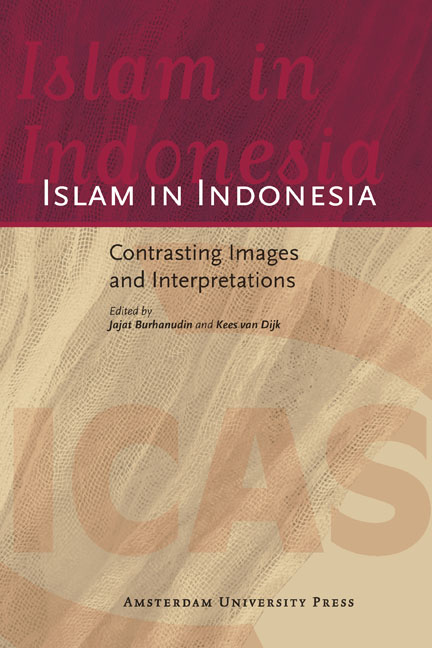Book contents
- Frontmatter
- Contents
- Introduction
- 1 Comparing Different streams of Islam: Wrestling with Words and Definitions
- 2 Defining Indonesian Islam: An Examination of the Construction of the National Islamic Identity of Traditionalist and Modernist Muslims
- 3 Indonesia in the Global Scheme of Islamic Things: Sustaining the Virtuous Circle of Education, Associations and Democracy
- 4 Distinguishing Indonesian Islam: Some Lessons to Learn
- 5 Islam, State and Society in Democratising Indonesia: A Historical Reflection
- 6 The Politics of Piety in the Pondok Pesantren Khusus Waria Al-Fattah Senin-Kamis Yogyakarta: Negotiating the Islamic Religious Embodiment
- 7 The Indonesian Muslim Feminist Reinterpretation of Inheritance
- 8 Managing Familial Issues: Unique Features of Legal Reform in Indonesia
- 9 A new Generation of Feminists within Traditional Islam: An Indonesian Exception
- 10 Religious Pluralism and Contested Religious Authority in Contemporary Indonesian Islam: A. Mustofa Bisri and Emha Ainun Nadjib
- 11 Islam and Humanitarian Affairs: The Middle Class and New Patterns of Social Activism
- 12 Dakwah radio in Surakarta: A Contest for Islamic Identity
- 13 Muslim Fundamentalism in Educational Institutions: A Case Study of Rohani Islam in High Schools in Cirebon
- 14 Majlis Tafsir Al-Qur’an and its Struggle for Islamic Reformism
- Glossary
- About the Editors and Contributors
- Bibliography
- Index
- Monographs
12 - Dakwah radio in Surakarta: A Contest for Islamic Identity
Published online by Cambridge University Press: 09 January 2021
- Frontmatter
- Contents
- Introduction
- 1 Comparing Different streams of Islam: Wrestling with Words and Definitions
- 2 Defining Indonesian Islam: An Examination of the Construction of the National Islamic Identity of Traditionalist and Modernist Muslims
- 3 Indonesia in the Global Scheme of Islamic Things: Sustaining the Virtuous Circle of Education, Associations and Democracy
- 4 Distinguishing Indonesian Islam: Some Lessons to Learn
- 5 Islam, State and Society in Democratising Indonesia: A Historical Reflection
- 6 The Politics of Piety in the Pondok Pesantren Khusus Waria Al-Fattah Senin-Kamis Yogyakarta: Negotiating the Islamic Religious Embodiment
- 7 The Indonesian Muslim Feminist Reinterpretation of Inheritance
- 8 Managing Familial Issues: Unique Features of Legal Reform in Indonesia
- 9 A new Generation of Feminists within Traditional Islam: An Indonesian Exception
- 10 Religious Pluralism and Contested Religious Authority in Contemporary Indonesian Islam: A. Mustofa Bisri and Emha Ainun Nadjib
- 11 Islam and Humanitarian Affairs: The Middle Class and New Patterns of Social Activism
- 12 Dakwah radio in Surakarta: A Contest for Islamic Identity
- 13 Muslim Fundamentalism in Educational Institutions: A Case Study of Rohani Islam in High Schools in Cirebon
- 14 Majlis Tafsir Al-Qur’an and its Struggle for Islamic Reformism
- Glossary
- About the Editors and Contributors
- Bibliography
- Index
- Monographs
Summary
Introduction
Surakarta is home to more than fifteen dakwah (Ar. da‘wa, Islamic propagation) radio stations with diverse Islamic orientations. These radio stations reflect the diversity of Islamic trends in the region. The significance of their role in religious life is indicated by the enthusiasm of listeners participating in the interactive programmes they broadcast. My aim is to examine the dakwah radio stations in Surakarta (Solo). The discussion will be limited to four stations: MTA FM, RDS FM, Suara Quran FM, and Suara Al-Hidayah FM. They have been selected partly for a practical reason – the accessibility of sources available on these stations – but also because they represent specific Islamic groups and identities. Other dakwah radio stations will be mentioned in passing, in order to make comparisons. I argue that these stations represent the diversity of Islamic trends in a region in which Islamic identity is being contested. Dakwah radio is a contested arena for Islamic identity among Muslim groups in the region.
This study is significant in several ways: first, there have been no studies to date on radio as a medium of Islamic expression in public life. The book New Media in the Muslim World: The Emerging Public Sphere, edited by Dale Eickelman and Jon Anderson (2003), does not include a specific article on Islamic dakwah radio. Brinkley Messick’s article on Radio Mufti (Messick 1996) explores the intellectual carrier favoured by Muslim preachers in Yemen, who broadcast their fatwas on the radio. Although he emphasises the importance of the radio, Messick pays less attention to how it has played a role in the emergence of new Muslim audiences. In line with the rise of Salafi dakwah in Indonesia, a number of writers have noted the important role of radio as a medium through which Salafi activists can spread their Islamic message to the public (e.g. Hasan 2002; Hefner 2003). However, they do not deal specifically with dakwah radio. Second, among existing types of audio-visual media, radio is relatively neglected compared to television (Abu-Lughod 2004) or the audio cassette (Hirschkind 2006). While the importance of radio in Indonesia's socio-cultural and political life has been the focus of a number of studies, none has paid attention to Islam-based, dakwah radio stations (for instance, Sen & Hill 2000; Jurriëns 2004).
- Type
- Chapter
- Information
- Islam in IndonesiaContrasting Images and Interpretations, pp. 195 - 214Publisher: Amsterdam University PressPrint publication year: 2013



